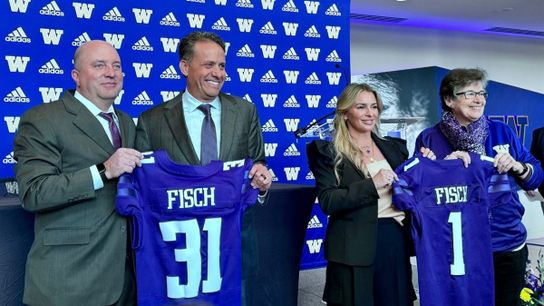After Lance Leipold passed on the Washington job, Jedd Fisch had two hours to decide if he wanted to leave Arizona for U-Dub.
"You start fighting with yourself saying, Is it easier to say no? Is it easier not to move? Is it easier to stay here, to just go with, okay I'm comfortable? And almost take the easy way out in a lot of ways," Fisch said in a recent interview with On3's Andy Staples. "And then you start to realize all of the potential and the upside.
"I'm going to work just as hard at that job versus this job. So if I'm going to work just as hard, why would I not want to put myself in a position where we can be at a different level for the years to come? We'll be able to have certain resources through the Big Ten multimedia rights."
The irony here is that, for the foreseeable future, Arizona and Washington's resources are going to be roughly equal. Washington and Oregon joined the Big Ten on half-shares, paying them roughly $30 million a year and rising incrementally each year. (Maryland, Nebraska and Rutgers each had to wait six years to fully vest in the B1G; USC and UCLA will enter as full-share members immediately.)
When Washington and Oregon's additions were announced last year, ESPN wrote (emphasis mine) that UW and OU's payouts would "grow every year and be competitive with, and perhaps surpass, the payouts of leagues such as the Big 12 and ACC."
Needless to say, joining the Big Ten to "perhaps surpass" Big 12 colleagues was not a top-line bullet point for Washington, but that's the reality.
To take it one step further, if Arizona and Washington were to play today, Arizona would likely win. Washington is the defending national runner-up in name only. The coaching staff is gone (obviously), along with nearly the entire starting lineup.
In the latest batch of Way-Too-Early top-25s, ESPN ranks Arizona 11th and Washington not at all. The Athletic slotted 'Zone 13th and didn't rank Washington. CBS has the most faith in Washington, ranking them 16th and Arizona 14th.
"We'll be able to have a certain schedule that is just hard to compete with, when you're playing all of these elite teams week in and week out," Fisch continued.
This is undoubtedly true. Washington's 2024 schedule will see the Huskies play Michigan and Penn State, in addition to USC, UCLA and Oregon. Future schedules will offer games against the likes of Ohio State, Wisconsin and Nebraska, plus the obvious benefit of semiannual games with Rutgers.
Arizona and the Big 12 do not offer that caliber of scheduling firepower. And, there are other benefits of B1G membership that Washington will get outside of reduced payout. The conference is currently negotiating to get more automatic berths and guaranteed money from the upcoming version of the College Football Playoff than every conference but the SEC.
Still, I bet those comments landed like a lead balloon in Tucson.
"It was really hard. It was emotional," Fisch said. "You make a lot of decisions where you've got to fight your brain with your heart."
Fisch is ambitious. The ambition that drove him out of Arizona after three seasons is the same ambition that pushed the Wildcats to their breakthrough 2023 season.
When Jedd Fisch got offered the Washington job, he got two hours to decide if he wanted to take it. He took us inside those two hours.
— Andy Staples (@Andy_Staples) March 8, 2024
Watch the whole interview on today's show (8 am ET or on demand anytime after on the @On3sports YouTube page).https://t.co/i5N281yJN0 pic.twitter.com/AHz3xOoPPR
As always, stay tuned to The Scoop for the latest.
